What is business process outsourcing? Business Process Outsourcing (BPO) refers to the practice of outsourcing certain business functions to third-party service providers. The main objective of BPO company is to improve operational efficiency, reduce costs, and improve the quality of services offered. BPO services can include customer service, human resources, finance and accounting, and other back-office functions. In this blog, we will explore the benefits, challenges, and best practices of BPO companies, as well as provide insights into the latest industry trends and developments.
Contents
- 1 How Does BPO Work?
- 2 What Are the Types of BPO Companies?
- 3 Some Outsourceable Back-Office Operations
- 4 Some Disadvantages of BPO
- 5
- 6 BPO Working Process
- 7 Top 9 Benefits of Business Process Outsourcing
- 8 BPO Market Size
- 9
- 10 How to Choose a BPO Provider in Bangladesh
- 11 Gaining Competitive Advantage in BPO with Enroute
- 12 Frequently Asked Questions
How Does BPO Work?
BPO transfers certain business functions to an external provider, allowing the client company to focus on core operations. The provider uses specialized tools and processes to manage the outsourced functions efficiently and effectively. Communication and performance metrics are crucial for a successful BPO partnership, with the goal of driving cost savings, efficiency, and quality improvements.
Understanding Back Office Outsourcing
Back-office operations outsourcing can make sense for companies looking to reduce costs, improve efficiency and productivity, and focus on core business operations. By transferring non-core functions to a third-party service provider, companies can take advantage of their expertise, specialized tools, and processes, and lower overhead costs. This can lead to improved performance and a competitive edge in the marketplace.
What Are the Types of BPO Companies?
BPO, or Business Process Outsourcing, encompasses a wide range of services, and there are various types of BPO companies to choose from. Let’s explore the different types of BPO companies and the services they offer.
- IT-Enabled Services (ITES) – provides technology-based services such as data entry, software development, and network management.
- Knowledge Process Outsourcing (KPO) – provides specialized services such as market research, business analysis, and legal support.
- Customer Service BPO – provides customer-facing services such as inbound call center services, technical support, and sales support.
- Healthcare BPO – provides specialized services for the healthcare industry, such as medical billing and coding, and claims processing.
- Financial BPO – provides financial services such as accounts payable/receivable, bookkeeping, and financial reporting.
- Human Resources BPO – provides HR services such as payroll processing, benefits administration, and recruitment.
- Supply Chain Management BPO – provides logistics and supply chain management services such as procurement, vendor management, and inventory control.
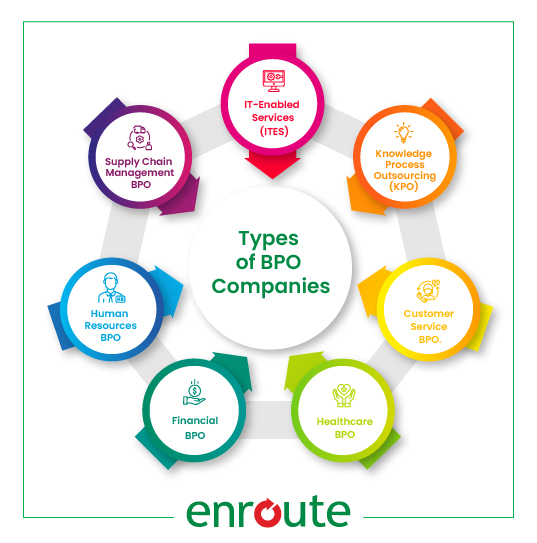
These are some of the most common types of BPO companies, and a company can choose to outsource one or more functions to a single provider or multiple providers, depending on its needs and goals.
Some Outsourceable Back-Office Operations
Back-office operations refer to the administrative and support tasks that are necessary to keep a business running smoothly but are not directly involved in the production of goods or services. The types of back-office operations that can be outsourced through BPO include:
- Finance and Accounting – including bookkeeping, accounts payable/receivable, and financial reporting.
- Human Resources – such as payroll processing, benefits administration, and recruitment.
- Information Technology – including data entry, software development, and network management.
- Procurement – including purchasing, supply chain management, and vendor management.
- Customer Services – such as inbound call center services and technical support.
- Data Management – including data entry, data analysis, and database management.
- Marketing and Sales Support – including lead generation, market research, and telemarketing.
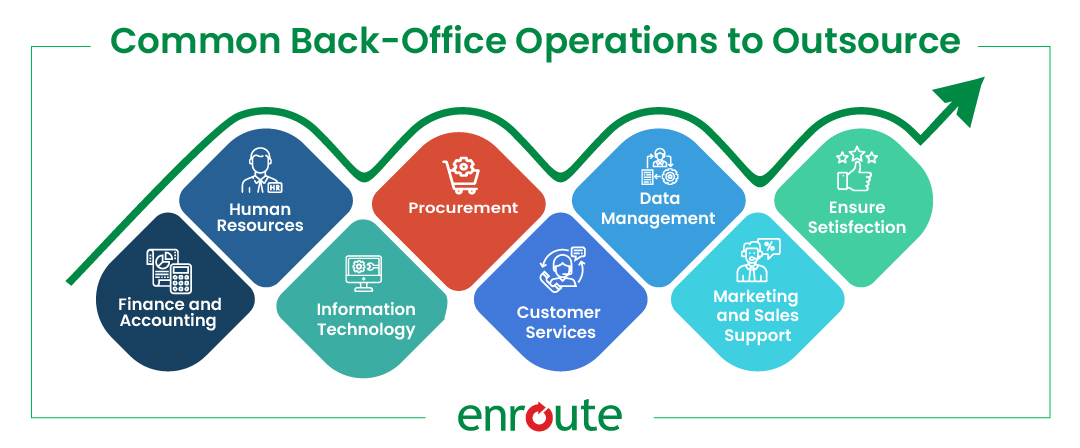
These are just some of the common types of back-office operations that can be outsourced. The specific functions that a company chooses to outsource will depend on its needs and goals.
What is BPO Used for?
BPO is used to outsource specific business functions to a third-party service provider. These functions may include customer service, human resources, finance and accounting, and other back-office operations. The goal of BPO company is to improve operational efficiency, reduce costs, and enhance the quality of services offered. By outsourcing these functions, companies can focus on their core business operations and achieve greater cost savings, increased productivity, and improved customer satisfaction.
Some Disadvantages of BPO
While outsourcing business processes can bring many benefits, it’s important to be aware of the potential challenges and disadvantages. From the loss of control to data security concerns, let’s take a closer look at some of the drawbacks of working with BPO company.
- Loss of Control – outsourcing can lead to a loss of control over certain business functions, which can result in a lack of transparency and decreased accountability.
- Quality Concerns – there may be concerns about the quality of services provided by BPO service providers, particularly if they are located in different regions or time zones.
- Communication Challenges – communication between the client company and service provider can be a challenge, especially if there are language or cultural differences.
- Dependency on Service Provider – outsourcing can lead to increased dependency on the service provider, which can be problematic if the provider experiences any issues or disruptions.
- Resistance to Change – there may be resistance to change from employees who are affected by the outsourcing of their functions, leading to morale issues and potential disputes.
- Data Security Concerns – outsourcing can lead to concerns about data security and privacy, as sensitive information may be shared with a third-party service provider.
In conclusion, while BPO can offer numerous advantages, it’s important for companies to carefully weigh the potential disadvantages and determine if outsourcing is the right solution for their unique needs and goals.
BPO Working Process
Business Process Outsourcing (BPO) typically starts with a needs assessment, during which the client company identifies the functions it would like to outsource. The company then selects a BPO service provider and enters into a contract that outlines the scope of the services to be provided and the terms of the agreement.
The service provider then assumes responsibility for the management and execution of the outsourced functions, using its own tools, processes, and staff. The provider may also work with the client company to streamline and improve these processes to achieve better results.
Throughout the outsourcing relationship, the client company and service provider work together to ensure that the functions are being managed effectively and efficiently. This may include regular check-ins, performance evaluations, and continuous improvement efforts.
In summary, BPO works by transferring non-core business functions to a third-party service provider, which assumes responsibility for the management and execution of these functions, freeing up the client company to focus on its core operations.
Outsourcing Type 1: Nearshore Outsourcing
Nearshore business process outsourcing is a cost-effective way to streamline business processes. With this outsourcing model, you can transfer your non-core business functions to a service provider located in a nearby country, taking advantage of lower labor costs, improved efficiency, and access to a skilled workforce leveraging the expertise of BPO company & BPO contracts. By outsourcing to a nearby country, you’ll minimize the cultural and time-zone differences that can impact communication and collaboration, ensuring seamless and effective delivery of your outsourced functions. So, why wait? Start exploring your nearshore outsourcing options today and see the difference they can make for your business.
Outsourcing Type 2: Offshore Outsourcing
Offshore business process outsourcing BPO involves transferring business processes to a foreign service provider to reduce costs. It’s a common practice to take advantage of lower labor costs in countries like Bangladesh, India, the Philippines, and China. The objective is to increase efficiency while reducing costs.
While offshore outsourcing offers benefits like lower labor costs and access to a skilled workforce, it also presents challenges like language and cultural differences and potential communication issues. However, companies continue to pursue this option as a means of achieving cost savings while maintaining the quality of their outsourced functions. Proper planning and careful consideration of potential challenges can help ensure a successful offshore outsourcing experience.
Top 9 Benefits of Business Process Outsourcing
Business Process Outsourcing (BPO) is a popular strategy among companies looking to streamline their operations which is creating newer opportunities in the BPO industry and helping reduce costs and improve their bottom line. The following are 9 common benefits of BPO that companies can experience by outsourcing their non-core business processes to a specialized service provider in Bangladesh.
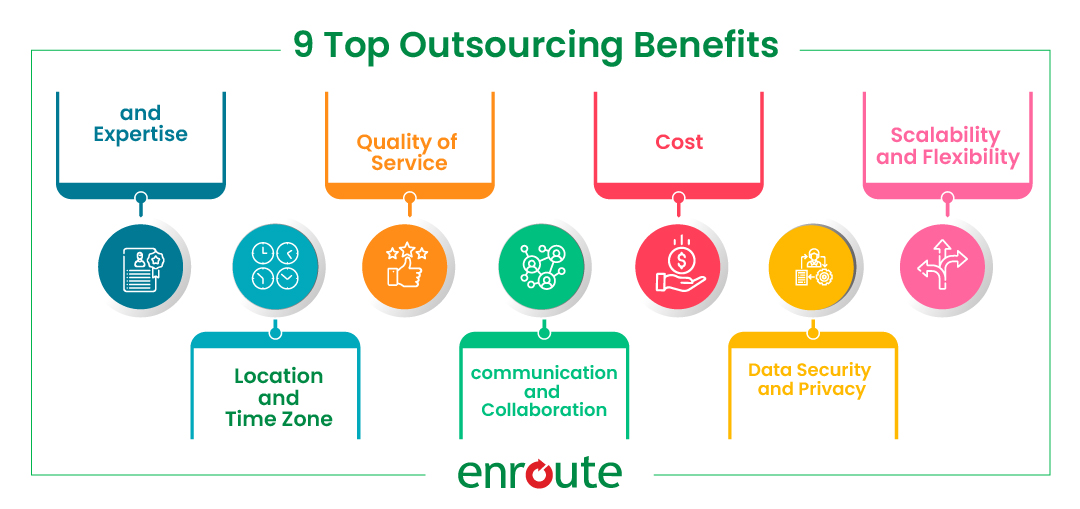
- Cost Savings: BPO can lower a company’s labor costs by outsourcing to countries with lower wages and a lower cost of living.
- Improved Efficiency: By outsourcing non-core business processes, companies can focus on their core competencies and improve overall efficiency.
- Access to Skilled Workforce: BPO enables companies to access a pool of skilled workers who can provide specialized services at a lower cost.
- Increased Flexibility: BPO allows companies to quickly scale up or down their operations as needed, providing greater flexibility in response to changes in the business environment.
- Improved Quality: Service providers specialize in their respective fields, providing companies with access to higher-quality services.
- Enhanced Customer Service: BPO can improve a company’s customer service operations, as service providers are equipped to handle high volume and diverse customer requests.
- Increased Innovation: BPO can free up a company’s resources and allow them to focus on innovation, leading to new products and services.
- Better Risk Management: BPO can help companies manage and mitigate risks by outsourcing processes to specialized service providers.
- Time Savings: BPO can save companies time by allowing them to focus on core functions while outsourcing non-core processes to service providers.
In short, BPO offers numerous benefits that can help companies streamline operations, cut costs, and stay ahead in the market. By outsourcing non-core processes, companies can improve quality and focus on their core competencies.
BPO Market Size
The global Business Process Outsourcing (BPO) market size was valued at USD 190.8 billion in 2020 and is expected to reach USD 316.3 billion by 2026, growing at a CAGR of 8.4% during the forecast period. The increasing demand for cost-effective and efficient business processes, along with the growing adoption of digital technologies, is driving the growth of the BPO market. BPO services are widely used by various industries, such as finance and banking, healthcare, retail, and IT, among others, to improve their operations, reduce costs, and enhance their competitiveness.
How to Choose a BPO Provider in Bangladesh
While you are looking for onshore outsourcing or looking to outsource business functions you need to tick some common boxes when you choose a business process outsourcing partner to handle your business function. Here are the things you need to look out for before you make a BPO contract with a provider in Bangladesh.
- Experience and Expertise: Look for a provider that has relevant experience and expertise in your industry and the specific processes you want to outsource.
- Quality of Service: Research the provider’s track record and reputation for delivering quality services, and ask for references and testimonials from past clients.
- Cost: Compare the provider’s pricing and cost structures to those of other providers, and consider the long-term cost benefits of outsourcing.
- Scalability and Flexibility: Choose a provider that can scale its services to meet your changing needs, and that offers flexible outsourcing options.
- Location and Time Zone: Consider the location and time zone of the provider, and whether it makes sense to outsource to a nearby country to minimize cultural and time-zone differences.
- Communication and Collaboration: Ensure that the provider has strong communication and collaboration capabilities and that you will be able to effectively communicate with the provider’s team.
- Data Security and Privacy: Consider the provider’s security and privacy policies, and make sure that the provider will be able to protect your sensitive data and intellectual property.
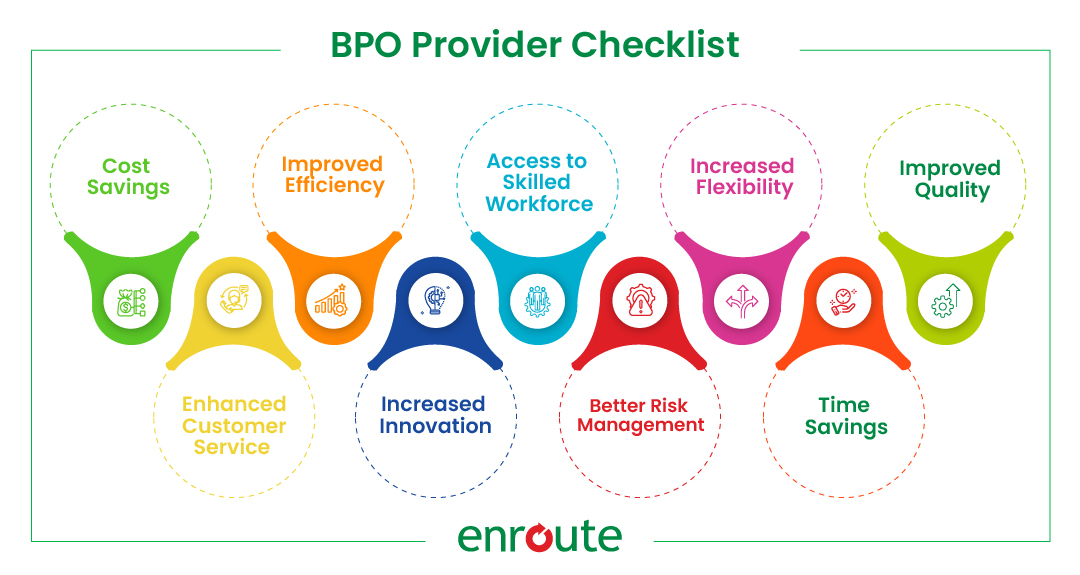
By carefully considering these factors and thoroughly researching potential BPO service providers, you can make an informed decision and choose a provider that will meet your outsourcing needs.
What Is a BPO Call Center?
A BPO call center is a customer service and support outsourcing service that handles customer inquiries, complaints, and technical support through phone and other communication channels. BPO call centers offer businesses cost-effective and efficient customer service, allowing them to focus on core business activities.
Supply Chain Management with BPO Company
Supply chain management with a BPO company involves outsourcing supply chain processes to improve efficiency and reduce costs. The BPO company takes on responsibilities like procurement, logistics, and inventory management, using its expertise and technology to streamline operations. This frees up internal resources for businesses and provides access to a global network, expanding reach and competitiveness.
Gaining Competitive Advantage in BPO with Enroute
If you’re looking to enhance your business operations and gain a competitive edge, look no further than Enroute. With over 15 years of experience in outsourcing and a proven track record of success, our team of experts can help take your business to the next level. By leveraging our expertise and technology, we can help streamline your supply chain and improve your efficiency, freeing up resources and allowing you to focus on what really matters. So why wait? Join the many MNCs, national companies, and NGOs that have already trusted Enroute for their outsourcing needs and start gaining a competitive advantage today!
Frequently Asked Questions
- What is Business Process Outsourcing (BPO)?
Answer: BPO is the process of outsourcing specific business functions to an external service provider, with the goal of improving efficiency and reducing costs.
- What are the Benefits of Outsourcing Business Processes to a BPO Company?
Answer: The benefits of BPO include reduced operational costs, increased efficiency, improved focus on core business functions, access to specialized expertise, and scalability.
- How Does a Company Choose a BPO Service Provider in Bangladesh?
Answer: When choosing a BPO service provider in Bangladesh, it is important to consider factors such as their experience and expertise, the type of processes they specialize in, their geographic location, their ability to align with your company’s values and culture, and their security and privacy protocols.
- What are the Types of BPO Companies?
Answer: BPO companies can specialize in various types of services, including customer service, back-office operations, finance and accounting, HR, and supply chain management.
- What is the Difference Between Nearshore Outsourcing and Offshore Outsourcing?
Answer: Nearshore outsourcing involves outsourcing to a service provider located in a nearby country, while offshore outsourcing involves outsourcing to a provider located in a distant country. The benefits of nearshore outsourcing include reduced cultural and time-zone differences, improved communication and collaboration, and lower labor costs. The benefits of offshore outsourcing include access to a larger pool of talent, reduced labor costs, and access to new markets.


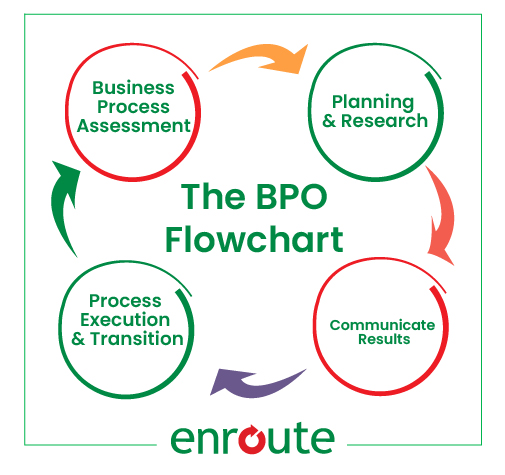
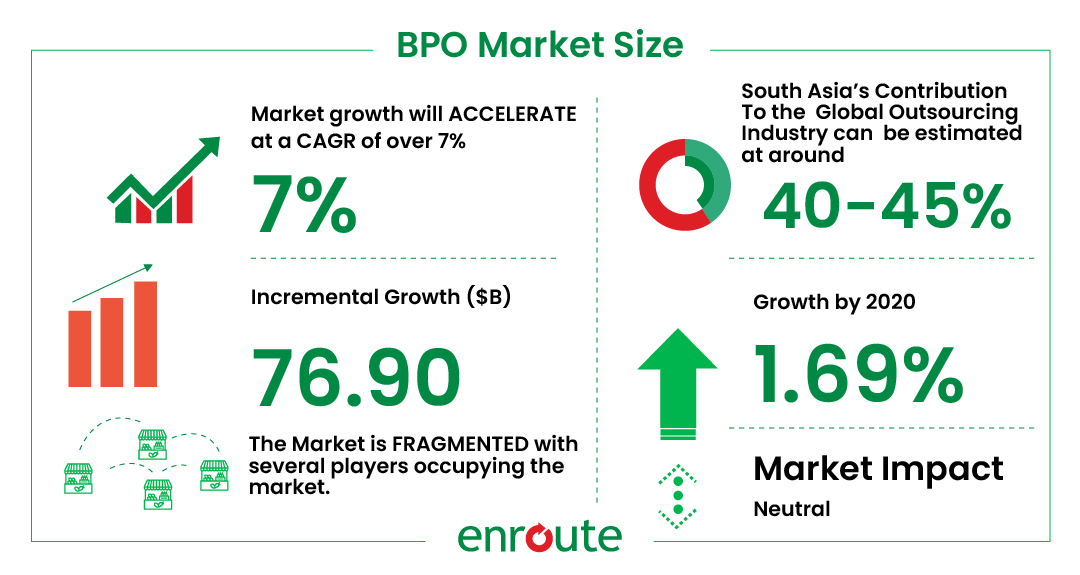
Leave a Reply